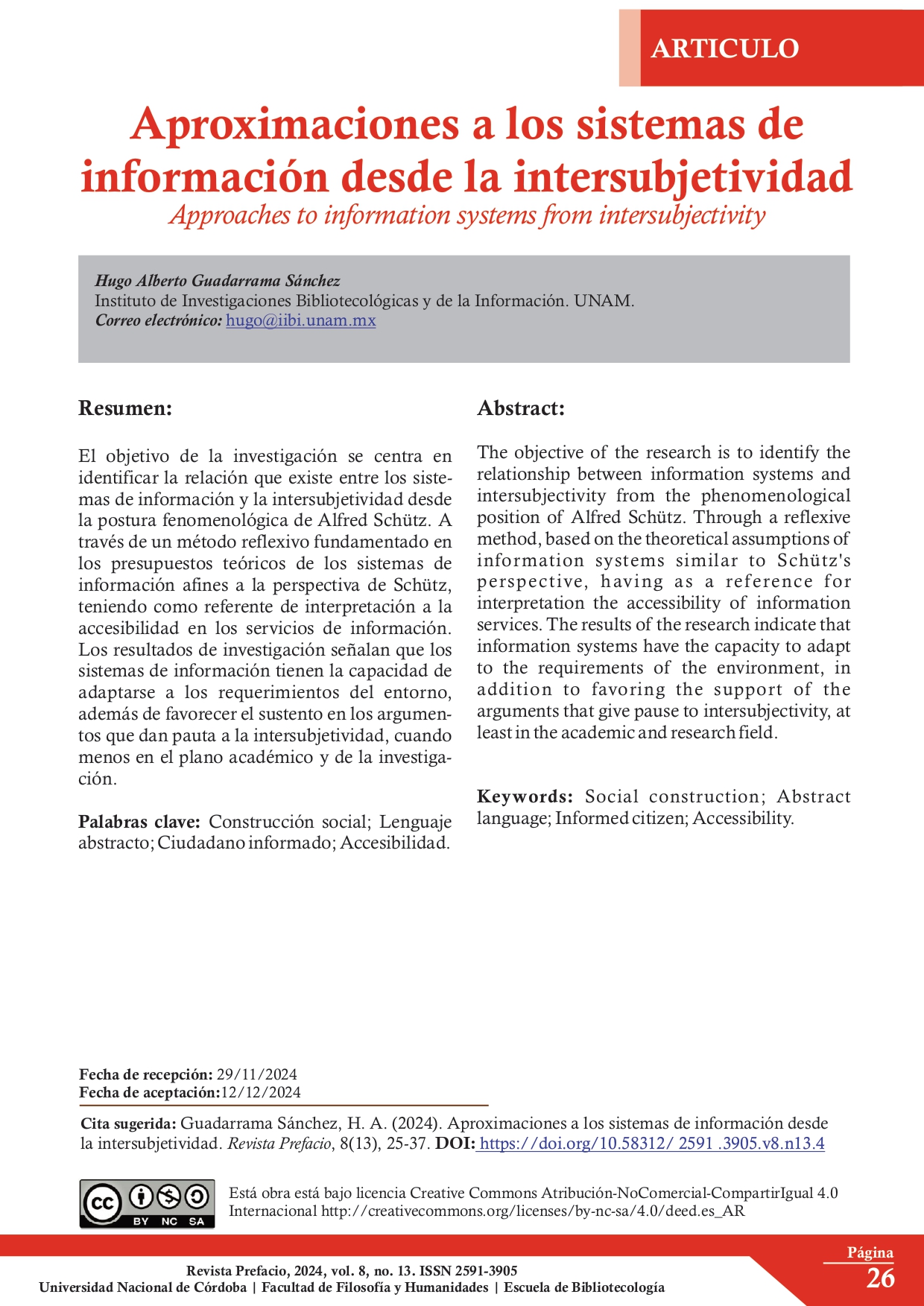Aproximaciones a los sistemas de información desde la intersubjetividad
DOI:
https://doi.org/10.58312/2591.3905.v8.n13.47513Palabras clave:
Construcción social, Lenguaje abstracto, Ciudadano informado, AccesibilidadResumen
El objetivo de la investigación se centra en identificar la relación que existe entre los sistemas de información y la intersubjetividad desde la postura fenomenológica de Alfred Schütz. A través de un método reflexivo fundamentado en los presupuestos teóricos de los sistemas de información afines a la perspectiva de Schütz, teniendo como referente de interpretación a la accesibilidad en los servicios de información. Los resultados de investigación señalan que los sistemas de información tienen la capacidad de adaptarse a los requerimientos del entorno, además de favorecer el sustento en los argumentos que dan pauta a la intersubjetividad, cuando menos en el plano académico y de la investigación.
Descargas
Referencias
Acebo, E. y Brie, R. (2006). Diccionario de Sociología. Claridad.
Acevedo, M. (2011). Aportes de la teoría social de Alfred Schütz para pensar la política y la acción colectiva. Trabajo y sociedad, 15(17), 83-94. https://www.redalyc.org/pdf/3873/387334689007.pdf
American Library Association.(1993). Standards for accreditation of master’s programs in Library and Information Studies 1992. ALA. https://www.ala.org/educationcareers/accreditedprograms/standards/standards
Bénel, A. y Lejeune, C. (2009). Humanities 2.0: documents, interpretation and intersubjectivity in the digital age. International journal of web based communities, 5(4), 562-576. https://doi.org/10.1504/IJWBC.2009.028090
Brugger, W. y Schöndorf, H. (2014). Diccionario de filosofía. (R. Gabas, Trad.). Herder.
Dorsch, F. (1985). Diccionario de Psicología. España: Editorial Herder.
Feinberg, M. (2012). Information studies, the humanities, and design research: interdisciplinary opportunities. iConference 2012, February 7-10, 2012, Toronto, Ontario, Canada. https://doi.org/10.1145/2132176.2132179
Ferrater, M. (2004). Diccionario de Filosofía. Colombia: Editorial Ariel.
Fioravante, E., Vieira da Cunha, M., Agustín, M. (2017). A biblioteca escolar a partir da perspectiva sociofenomenológica. Revista interamericana de bibliotecología, 40(3), 305-315. https://doi.org/10.17533/udea.rib.v40n3a09
Galimberti, U. (2002). Diccionario de Psicología. México: de Siglo XXI Editores.
Gros, A. (2016). Alfred Schütz, un fenomenólogo inusual: una reconstrucción sistemática de la recepción Schutziana de Husserl. Discusiones filosóficas, 17(29), 149–173. https://doi.org/10.17151/difil.2016.17.29.10
Hernández, Y. y Galindo, R. (2007). El concepto de intersubjetividad en Alfred Schutz. Espacios públicos, 10(20), 228-240. https://www.redalyc.org/pdf/676/67602012.pdf
Hillmann, K. (1994). Diccionario enciclopédico de Sociología. España: Editorial Herder.
Honderich, T. (1995). Enciclopedia Oxford de Filosofía. (C. García, Trad.). España: Editorial Tecnos.
Husserl, E. (1979). Meditaciones cartesianas. (M. Presas, Trad.). Ediciones Paulinas.
Lee, A. (2004). Thinking about social theory and philosophy for information systems. En J. Mingers y L. Willcocks (Eds.), Social theory and philosophy for information systems. (pp. 1-26). John Wiley & Sons, Ltd. http://www.people.vcu.edu/~aslee/Lee-Social-Theory-Philosophy-2004.pdf
Lien, B., Pauleen, D., Kuo, Y. y Wang, T. (2014). The rationality and objectivity of reflection in phenomenological research. Quality & Quantity: international journal of methodology, 44(1), 189-196. https://doi.org/10.1007/s11135-012-9759-3
Mingers, J. (1995). Information and meaning: foundations for an intersubjective account. Information systems journal, 5(4), 285-306. https://kar.kent.ac.uk/3798/
Mingers, J. (1996a). An evaluation of theories of information with regard to the semantic and pragmatic aspects of information systems. Systems practice, 9(3), 187-209. https://doi.org/10.1007/BF02169014
Mingers, J. (1996b). Embodying information systems. En W. Orlikowski., G. Walsham., M. Jones y J. Degross (Eds.), Information technology and changes in organizational work. (pp. 272-292). Springer. https://doi.org/10.1007/978-0-387-34872-8_17
Motta, R. (2011). Reconstrucción de la crítica de Schütz a Husserl en torno al concepto de unidades personales de nivel superior o comunidad. Intersticios: revista sociológica de pensamiento crítico, 5(2), 365-372. https://intersticios.es/article/view/8754
Narrog, H. (2017). Three types of subjectivity, three types of intersubjectivity, their dynamicization and a synthesis. En H. Cuyckens., L. Ghesquière y D. Van Olmen (Eds.), Aspects of Grammaticalization. De Gruyter Mouton. 2017. 19-46. https://doi.org/10.1515/9783110492347-002
Perlin, S. (2024). La crítica de Alfred Schütz a la intersubjetividad Husserliana: exposición y respuesta. Devenires, 25(49), 179-218. https://doi.org/10.35830/devenires.v25i49.898
Rizo, M. (2006). La intersubjetividad y la vida cotidiana como objetos de estudio de la ciencia de la comunicación: exploraciones teóricas y abordajes empíricos. En Anuario De Investigación De la Comunicación CONEICC XIII. (pp. 85-107). https://doi.org/10.38056/2006aiccXIII282
Savolainen, R. y Kari, J. (2004). Placing the Internet in information source horizons: a study of information seeking by Internet users in the context of self-development. Library & information science research, 26(4), 415-433. https://www.sciencedirect.com/science/article/pii/S0740818804000520
Savolainen, R. (2007). Information source horizons and source preferences of environmental activists: a social phenomenological approach. Journal of the American society for information science and technology, 58(12),1709–1719. https://doi.org/10.1002/asi.20644
Schütz, A. (1962). El problema de la realidad social. (N. Míguez, Trad.). Amorrortu editores.
Schütz, A. (1976). Fenomenología del mundo social: introducción a la sociología comprensiva. (E. Prieto, Trad.). Paidós.
Schütz, A. (2003). Estudios sobre teoría social: Escritos II. (N. Míguez, Trad.). Amorrortu editores.
Smiraglia, R. (2014). Cultural synergy in information institutions. Springer.
Sonnenwald, D. (1999). Evolving perspectives of human information behavior: contexts, situations, social networks and information horizons. En T. Wilson y A. David (Eds.), Exploring the Contexts of Information Behaviour. (pp. 176-190). Taylor Graham. https://www.researchgate.net/publication/28805117_Evolving_Perspectives_of_Human_Information_Behavior_Contexts_Situations_Social_Networks_and_Information_Horizons
Uña, O. y Hernández, A. (2004). Diccionario de Sociología. ESIC.
Vargas, G. (2018). El análisis reflexivo y el método fenomenológico: contribución a la detrascendentalización de la fenomenología. Investigaciones fenomenológicas, (7), 237-255. https://doi.org/10.5944/rif.7.2018.29935
Vivero, L. (2005). La intersubjetividad y la construcción del mundo social. Cuadernos de trabajo social, (1), 44-47. https://tscuadernosdetrabajosocial.cl/index.php/TS/article/view/49/47
Warren, H. (1970). Diccionario de Psicología. (E. Ímaz, A. Alatorre y L. Alaminos, Trad.). Fondo de Cultura Económica.
Willis, P. (1999). Looking for what it's really like: phenomenology in reflective practice. Studies in continuing education, 21(1), 91-112. https://doi.org/10.1080/0158037990210106
Wise, V. (1998). Of lizards, intersubjective zap, and trashing: critical legal studies and the librarian. Legal reference services quarterly, 8(1), 7-27. https://doi.org/10.1300/J113v08n01_02









